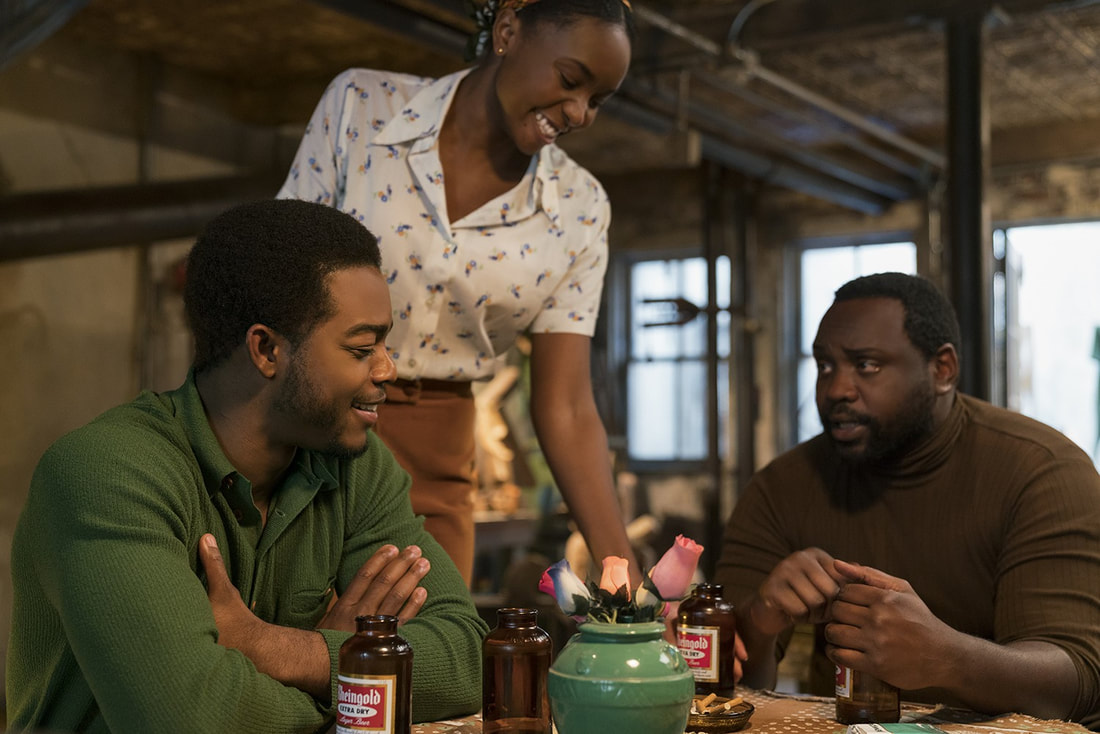What marks a film as a product of Jenkins’ eye are his close-ups, which an apt Twitter critic summed up as ‘find a person who looks at you like Barry Jenkins’ camera looks at his characters.’ This viewer is not well-versed enough in lenses and frames to know what exactly it is Jenkins and cinematographer James Laxton are doing when they film faces, but it is magical. Every time a character takes up the screen, the frame is worthy of a museum, an assertion as true for characters the film loves (Fonny, Tish) as it is for Skrein’s crooked cop. King’s Sharon deplaning in the accuser’s native Puerto Rico is an all-timer, but that’s only one of many. Every actor in Beale Street can rest assured that when they’re memorialized in an Oscars In Memoriam reel, they have their clip ready to go.
Jenkins’ extension of supreme generosity to his characters doesn’t mean that the invisible world behind the film’s events feels the same way. Baldwin indicted whole systems in his writings, and the same holds here. A system that would empower one unscrupulous cop to so dramatically alter a man’s life practically absolves the cop himself of his sins, a state that trite racial nonsense like Green Book forgets. For Fonny, once a bad actor acts against him, wheels have begun spinning that will ensure that an easily disprovable accusation takes on a life of its own, and those wheels proceed to grind up people lacking in goodwill or resources. Beale Street’s world isn’t immune from good deeds and charity, as represented by a landlord (Dave Franco) who finally agrees to rent to Fonny and Tish or by a lawyer (Finn Wittrock) who takes Fonny’s case for whatever Tish can scrape together, but the inertia of a system comfortable with injustice renders that charity useless. Finding the love and beauty that flourishes in spite of oppression seems to be a recurring theme in Baldwin’s writings, at least as far as I Am Not Your Negro goes which is my only real experience with the author, and that’s a good fit for Jenkins’ empathetic lens as well.
The individuals operating within the strictures of a confining world provide Beale Street with a buoyancy that makes navigation simpler or an anchor that drags them down. Tish’s family comprises a warm and functional unit, where the reserved Tish is supported by her soft-hearted father (Colman Domingo) and proud sister (Teyonah Parris), to say nothing of her velvet hammer mother. Their chemistry together makes for lively evenings where the viewer wants to be in the room with them, especially on occasions where Domingo’s Joe breaks out the ‘good bottle.’ Fonny’s family, with the exception of outlier father Frank (Michael Beach), is the polar opposite. Mother Alice (Aunjanue Ellis) is immediately recognizable as a tiresome religious storm cloud, a person who’s only paid attention to the first half of the proverb, ‘pray to god, but row to shore.’ Everything’s either a blessing or a blasphemy to Alice, and a baby borne out of wedlock, even between two people in love, can only be a sin and a false imprisonment can only be cosmic payback for that sin, all of which are hateful propositions to Tish’s family. In between the hopefulness of the Rivers and the smug resignation of the Hunts rests Brian Tyree Henry’s Daniel, an old friend of Fonny’s and a specter of what he could look like after a long prison term. Daniel is a haunted man who’ll be surprised if he ever catches a break, but he still allows for the possibility of goodness in the form of a congenial evening spent with Tish and Fonny. Large gestures are beyond him, but small ones can still get through his pain.
Beale Street has a strong grasp on all of its characters except for the one it spends the most time with. Tish is less an active participant in the film and more of an observer. Sometimes, this works, like in a standout scene of her days at a perfume counter and her differentiating between how white and black men smell her samples. Mostly, it’s a mark of frustrating passivity. In the highest heights of their relationship, she and Fonny plainly belong together, but away from these peaks, he’s given to tantrums even before his legal troubles. Tish’s response is meek and pliant, and it reads as if she’s scared of or intimidated by this man, such that there’s a small level of rooting interest in the dissolution of the relationship and her getting away from him. Newcomer Layne invests Tish with none of the fire that her mother or sister possess, and the film provides her with no arc wherein she finds her assertiveness over the course of this ordeal. To further illustrate this and to once more, perhaps unfairly, compare Beale Street to Moonlight, both contain a scene of a character cooking for another. In Moonlight, Jenkins watches the preparation and films it like a ritual of serenity and generosity. In Beale Street, Jenkins ignores Tish as she cooks for Fonny and Daniel, focusing on them as they wait for their supper and leaving her as a functionary instead of a provider. She takes up a large amount of time onscreen, but the film doesn’t make room for her interior life beyond a plodding narration that never justifies its presence.
That a film contains moments or sequences of irritation doesn’t mean it’s incapable of transcendence, a mode that Jenkins is frequently comfortable in. When it’s working, Beale Street is a finely tuned tear-extraction machine, where perfect frames are matched with peerless melodies and the desired result cannot help but be produced. Though Beale Street rests firmly in the shadow of Jenkins’ masterpiece, it’s evidence that he’s no one-hit wonder, and he’ll hopefully churn out many of these in a long career. B+

 RSS Feed
RSS Feed